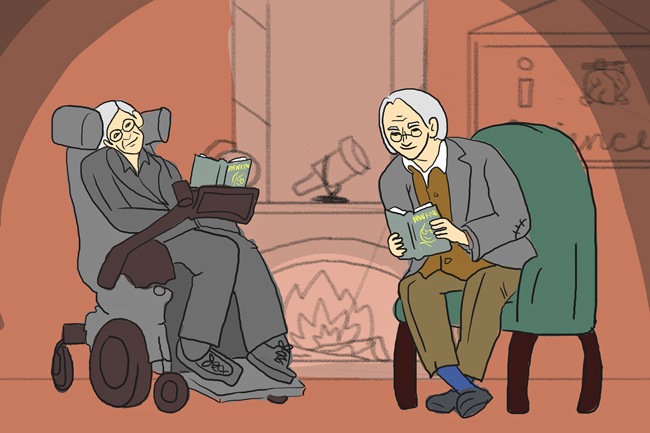In one corner, we have prominent astrophysicist Stephen Hawking, well-known for his books about the
universe.
In the other, we have evolutionary biologist Richard Dawkins, who popularized the “selfish gene” view of natural selection and provided a face for the atheist movement.
These major scientific figures both released memoirs this month, but neither one offers the level of insight that readers expected.
Hawking’s memoir, “My Brief History,” is the lighter of the two and perhaps does a better job of providing an overview of the author’s life. At a scant 144 pages, with many pictures, there are times when it reads like a high school essay. It goes over the expected beats, but there’s little that can’t be found in Hawking’s
Wikipedia entry.
His style is light and modest, sometimes amusing — “When I was 12, one of my friends bet another friend a bag of sweets that I would never amount to anything. I don’t know if this bet was ever settled, and if so, which way it was decided,” — but the point of a memoir isn’t to just go over the details of your life, it’s to provide some level of perspective looking back on it. Major events, such as Hawking’s divorces, are glossed over briefly, without going into details about the events or emotions that led to them.
Dawkins’ memoir, “An Appetite for Wonder,” suffers from the same problem, which only adds to the stereotype of the emotionless Spock-like scientist. Additionally, Dawkins distracts himself every chance he can to make obvious and out-of-place jabs at religion. Though some of his stories are amusing, many of them more closely resemble the ramblings of a man who needs to let go of the talking stick and give someone
else a chance.
The second half of both books are more exciting than the first because instead of looking at childhood moments, they focus on the science they each did in order to become prominent in their fields. Hawking’s thoughts on black holes and other strange phenomena in our universe read interestingly at times. But when it comes to astrophysics, it’s nearly impossible to present anything in a way that will make sense to a layperson. Dawkins fairs better, but he’s working with easier material — animal behavior.
Neither book is entirely
satisfying, with Dawkins’ being especially disappointing because it includes a few problematic passages that will likely rub readers the wrong way: One has already made headlines for dismissing claims of childhood sexual abuse and another accuses his critics of attacking him for being an educated white male, showing that he doesn’t understand the first thing about the concept of privilege. Hawking also offers up a few lines that will make some readers cringe, such as his
suggestion “that disabled people should concentrate on things that their handicap doesn’t prevent them from doing and not regret those they can’t do.”
Despite the underwhelming nature of both titles, it’s hard not to recommend them to those who admire the
scientists. These are brilliant men who at least attempt to describe the paths they took. That they can’t truly reveal any of their dark secrets, mistakes and regrets they’ve made along the way perhaps reveals more about their personalities than
they realize.















